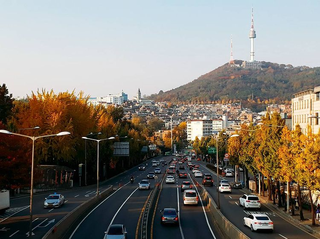
Yongsan District is one of the 25 districts of Seoul, South Korea.

Kyunggi High School is the oldest modern high school in Korea, located in Gangnam District, Seoul. The school is an all-boys school, and its counterpart is Kyunggi Girls' High School, also located in Gangnam District, Seoul.
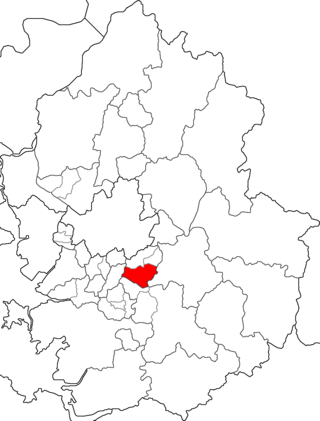
Bundang-gu is the largest and most populous district (gu) of Seongnam, a major city in the Seoul Capital Area, South Korea. Bundang-gu is one of South Korea's wealthiest and highest developed areas, being the nation's first and largest completely artificial city built in the early 1990s. Many high-rise luxury condos moved in the early 2000s, with a second planned city built in the late 2000s called Pangyo in the same district. Apartment prices are the second highest in Gyeonggi-do after Gwacheon and 7th highest nationwide, higher than many central Seoul districts such as Mapo-gu or Jongno-gu. Apartments around Pangyo station and the high-rise luxury condos around Jeongja station and Sunae station rival prices in the most expensive areas in the country. Unlike older cities such as Seoul, Bundang has no telephone poles overground, resulting in a clean cityscape with well-designed streets.
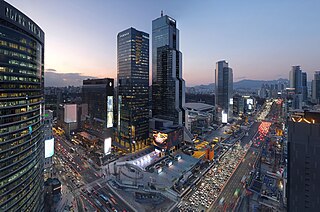
Gangnam District is one of the 25 districts of Seoul, South Korea. The term Gangnam translates to "South of the [Han] River". Gangnam District is the third largest district in Seoul, with an area of 39.5 km2 (15.3 sq mi). As of the 2017 census, Gangnam District had a population of 561,052. There is a high concentration of wealth in the district, with prices for an apartment as of 2020 nearly double those in the rest of Seoul. Gangnam District is part of Gangnam School District Eight, along with the Seocho District. This district shares half of Gangnam-daero Gangnam Station area with Seocho District, which is one of the most crowded places in South Korea.

Myeongdong is a dong in Jung-gu, Seoul, South Korea between Chungmu-ro, Eulji-ro, and Namdaemun-ro. It covers 0.99km² with a population of 3,409 and is mostly a commercial area, being one of Seoul's main shopping, parade route and tourism districts. In 2011, 2012 and 2013, Myeong-dong was listed as the ninth most expensive shopping street in the world. The area is known for its two historically significant sites, namely the Myeongdong Cathedral and the Myeongdong Nanta Theatre.

Yeongdeungpo District is an administrative district in southwest Seoul, South Korea. Although the origin of the name is uncertain, the first two syllables are thought to be from "yeongdeung" (靈登) or "divine ascent", a shamanic rite. The third syllable is "po", representing the bank of a river (浦), referring to the district's position on the Han River. The 2006 population was 408,819.
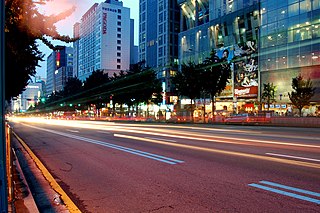
Seodaemun District is one of the 25 districts of Seoul, South Korea.

Seocho District is one of the 25 local government districts which make up the city of Seoul, South Korea. Seocho is considered a part of the Gangnam region, along with the Gangnam and Songpa districts of Seoul. Seocho District ranks as one of the richest neighborhoods in South Korea and among the most expensive areas in Seoul with an average sales price of 47.75 million South Korean won per 3.3 square meters. Many of the wealthiest residents are concentrated in the three Gangnam districts including Seocho, known as Gangnam School District Eight.
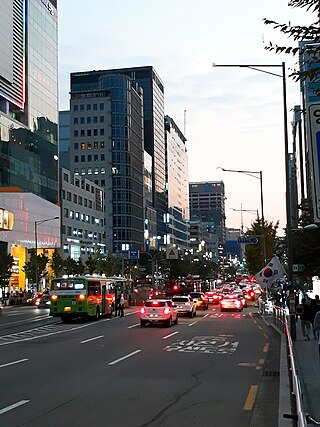
Mapo District is one of the 25 districts of Seoul, South Korea.

Ichon Station is a station in Yongsan-gu, Seoul on Seoul Subway Line 4 and Gyeongui–Jungang Line. This station is the closest to the National Museum of Korea, situated in the interior of Yongsan Family Park. It also serves eastern Ichon-dong, home to the largest Japanese community in South Korea with some 1,300 Japanese residents.
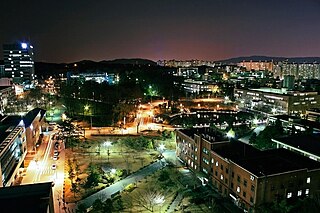
Nowon District (Nowon-gu) is a residential district of Seoul, South Korea, located in the most northeastern part of the metropolitan city. It has the highest population density in Seoul, with 619,509 people living in the area of 35.44 km².

Gangdong District (Gangdong-gu) is one of the 25 gu which make up the city of Seoul, South Korea. Gangdong is literally "east of the (Han) River". It is located on the east side of the city.

Guro District (Guro-gu) is a district of Seoul, South Korea, which was separated from Yeongdeungpo District on April 1, 1980. Located in the southwestern part of the city, where besides Yangcheon District and Geumcheon District Guro District has an important position as a transport link which contains railroads, land routes from the rest of Seoul to the south of the country. The Gyeongbu and Gyeongin railway lines connect Seoul to Busan and Incheon. In addition, Seoul Metropolitan Subway lines 1, 2, and 7, and major highways intersect in Guro District.

Geumcheon District (Geumcheon-gu) is one of the 25 gu (districts) of Seoul, South Korea. It was created from southern parts of Guro-gu and tiny sections from Gwangmyeong in 1995. Its district office is located in front of Siheung Station, now Geumcheon-gu Office Station, in Siheung-dong.

Gwangjin District is one of the 25 districts of Seoul, South Korea. It is located on the north bank of the Han River on the eastern end of Seoul. The district was split from the neighboring Seongdong District in 1995.

Banghak station is a subway station on Line 1 of the Seoul Metropolitan Subway. It is the closest station to the Dobong-gu District Office in Seoul.

Yeoksam-dong is a ward of Gangnam-gu, Seoul, South Korea. Teheranno runs through Yeoksam-dong and has some of the tallest buildings in Seoul, comprising a collection of corporate headquarters and high-rise office buildings.
Sindorim-dong is a dong, neighbourhood of Guro-gu in Seoul, South Korea.
Sangam-dong is a legal dong (neighborhood) of the Mapo District in Seoul, South Korea. In the wake of the 2002 FIFA World Cup, a large apartment complex and DMC business district have been created and developed into the center of western Seoul.

Seoul, officially known as the Seoul Special City, is the capital and largest metropolis of the Republic of Korea. According to the 2020 census, Seoul has a population of 9.9 million people, and forms the heart of the Seoul Capital Area with the surrounding Incheon metropolis and Gyeonggi province. Considered to be a global city and rated as an Alpha – City by Globalization and World Cities Research Network (GaWC), Seoul was the world's fourth largest metropolitan economy in 2014, following Tokyo, New York City and Los Angeles.



















